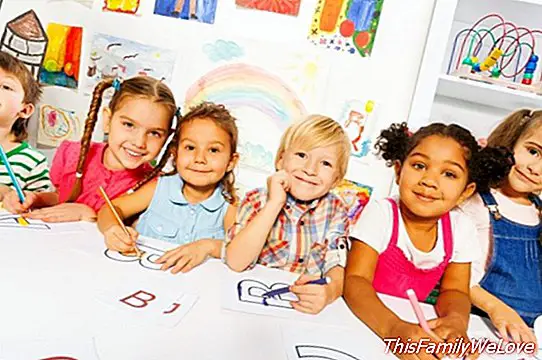How children learn: this is how your brain works

The brain development Human is carried out especially in the first stages of life, favored by the capacity of amazement of children, by their curiosity, since they are their "motor" of learning. It is also built with the stimuli of everyday life, in an environment full of love, as is the family.
The brain development of children
The formation of brain of children it is carried out since gestation, and is a consequence of the multiplication of neurons and the formation of connections or synapses between them. Genes determine the pattern and basic functioning of brain circuits, but hormones also influence, especially in adolescence, where there is a very considerable rise.
Already since pregnancy, changes appear according to the environment, the relationship with others, how they affect us, the environment, the behavior itself, the sound of the voice ..., which shape the baby's brain.
When the child is already in the cradle, with the times of sleep, meals, hygiene, walks ... there is a neuronal growth, and multiple ramifications are formed in them. And when it grows up, with schedules, daily routines, habits, family situations ..., based on executing some actions, the same thing happens: there is a great explosion of ramifications.
Therefore, it is necessary to accompany them in their growth, to guide their learning, respecting their natural rhythms, and help them discover the world, in an environment immersed in love. The most important period for this is up to 12 years, which is a period of formation of innumerable synapses.
It is necessary to let him know things, learn from the "inside" of his person, approach nature, lean on beauty, count on his growth rhythms, his tranquility, his innocence, his times of rest, of games, so that go knowing things, and interacting with others. Because they always look at everything with "new eyes" ... It is necessary not to give them everything done, not to interfere in the natural process of development.
The maturation process of the children's brain
At the level of cerebral lobes, the first to mature are the parietal zones, which coordinate the movement more. That's why they love to move, and it's necessary. Subsequently, the sensory zones, and later the cognitive and emotional zone, with the limbic system.
The last to mature in the brain is the prefrontal cortex, the most specific of each person, with its connections, the basis of thought itself, impulse control, decision making, judgment, etc. And this ends after 25 years or so.
Therefore, the adolescent brain has not finished maturing: they are all emotions, but the control of them, the decision making, is still immature. We can not leave them alone before some situations.
We can take advantage of this knowledge of neurological development, in the education of children, in their maturation, to favor the right synapses that will help them throughout their lives. Because day-to-day actions create habits, with their corresponding synapses and connections between zones, and these habits shape the character of each person, with their unique strengths as well, if we know how to stimulate them.
How children learn: how the brain works
It is about letting children be surprised by the things they see, of reality, allowing their curiosity for what surrounds them, let their imagination, creativity, and teach them according to each age. And always, guided by the feeling of knowing oneself.
The "golden age" for learning happens before age 8. What a child likes most is to move freely. The more opportunities for movement, for experiential knowledge, for physical exercise, the better. And the more senses you use, the better you know the world around you and the better you will develop your abilities, thanks to that sensitive phase of brain maturation.
We can also teach them to have healthy habits, because in these ages, sensitive periods appear, in which it is very easy to acquire human values, such as order, sincerity, attend to feelings, think about others, the value of effort , of will, resilience, generosity, responsibility, empathy ... etc.
And the relationship with other people is very important, not only of the family, but also with friends, because a friend is much more enriching than any toy. Always, I insist, knowing yourselves very dear. The love we give them is the architect of their good development.
On the other hand, the game is important in your life, since birth. Everything he learns through affective, through the game and we can take advantage of to do cerebral gymnastics with them. For him, everything is game, or is transformed into a game: learn by playing, play by learning, enjoy playing. Life is play, and through the game you learn the rules of life.
María José Calvo Blog author Optimists educating and loving




